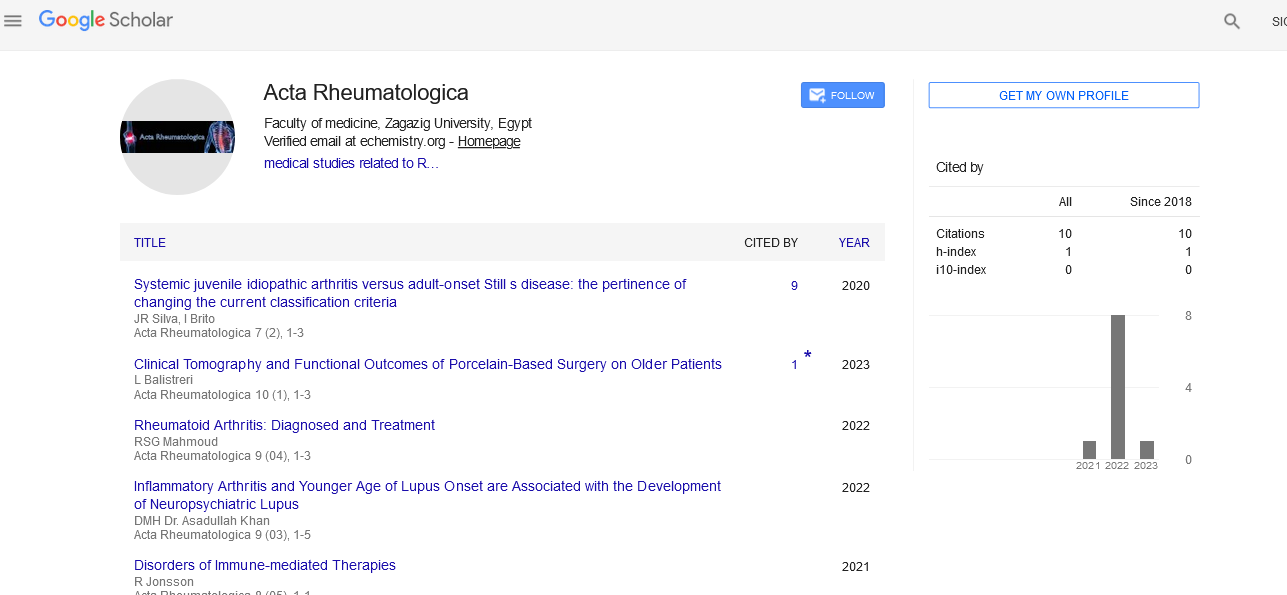Perspective - (2024) Volume 11, Issue 3
Unveiling the Intricacies of Autoimmune Diseases: A Journey Through Diagnosis, Treatment, and Beyond
Roberta Ramonda*
Department of Immunology, University of Siena, Siena, Italy
*Correspondence:
Roberta Ramonda, Department of Immunology, University of Siena, Siena,
Italy,
Email:
Received: 03-May-2024, Manuscript No. IPAR-24-14796;
Editor assigned: 06-May-2024, Pre QC No. IPAR-24-14796 (PQ);
Reviewed: 21-May-2024, QC No. IPAR-24-14796;
Revised: 29-May-2024, Manuscript No. IPAR-24-14796 (R);
Published:
06-Jun-2024
Introduction
Autoimmune diseases constitute a complex array of disorders
where the body's immune system erroneously attacks its own
tissues. With over 80 recognized autoimmune conditions,
including rheumatoid arthritis, lupus, and multiple sclerosis,
these diseases collectively affect millions worldwide. This article
navigates the labyrinth of autoimmune diseases, from their
enigmatic origins to the latest advancements in diagnosis,
treatment, and ongoing research.
Understanding autoimmunity is the immune system's primary
role is to protect the body from foreign invaders. However, in
autoimmune diseases, this defense mechanism malfunctions,
leading to immune cells targeting healthy tissues. Genetic
predisposition, environmental triggers, and dysregulation of
immune responses contribute to this phenomenon. While the
exact triggers remain elusive, factors such as infections,
hormonal changes, and certain medications can exacerbate
autoimmune reactions.
Description
Diagnostic challenges
Diagnosing autoimmune diseases poses a formidable
challenge due to their diverse symptoms and overlapping
manifestations with other conditions. Patients often endure a
prolonged diagnostic odyssey, encountering misdiagnoses and
delays in receiving appropriate care. Clinicians rely on a
combination of medical history, physical examinations,
laboratory tests, and imaging studies to unravel the diagnostic
puzzle. Emerging technologies, including advanced imaging
modalities and novel biomarkers, hold promise for earlier and
more accurate diagnoses.
Treatment landscape
Treatment strategies for autoimmune diseases aim to alleviate
symptoms, suppress immune responses, and prevent disease
progression. Nonsteroidal Anti-Inflammatory Drugs (NSAIDs),
corticosteroids, and Disease-Modifying Antirheumatic Drugs
(DMARDs) form the cornerstone of pharmacological management.
Biologic therapies, such as TNF-alpha inhibitors and interleukin-6
receptor antagonists, offer targeted approaches by neutralizing
specific immune mediators. Additionally, Janus Kinase (JAK)
inhibitors and monoclonal antibodies are expanding the
therapeutic arsenal, providing new avenues for personalized
treatment regimens.
The role of lifestyle interventions
Beyond pharmacotherapy, lifestyle modifications play a
pivotal role in managing autoimmune diseases. Adopting a well-balanced
diet rich in anti-inflammatory foods, such as fruits,
vegetables, and omega-3 fatty acids, can mitigate inflammation
and enhance overall health. Regular exercise not only improves
physical function but also exerts beneficial effects on immune
regulation and psychological well-being. Moreover, stress-reduction
techniques, including meditation and mindfulness
practices, may attenuate disease flares and improve quality of
life.
Innovations in research
The landscape of autoimmune disease research is evolving
rapidly, driven by advances in immunology, genetics, and
molecular biology. Genome-Wide Association Studies (GWAS)
have identified numerous susceptibility loci, shedding light on
the genetic underpinnings of autoimmune disorders.
Immunotherapies, such as immune checkpoint inhibitors and
engineered T cell therapies, hold promise for restoring immune
tolerance and achieving long-term remission. Furthermore, the
burgeoning field of microbiome research unravels the intricate
interplay between gut microbes and immune function, offering
novel therapeutic avenues through microbiota-targeted
interventions.
Patient empowerment and advocacy
Empowering patients with autoimmune diseases entails
fostering a supportive healthcare ecosystem that prioritizes
education, self-management, and shared decision-making.
Patient advocacy organizations play a pivotal role in raising
awareness, promoting research, and advocating for equitable
access to care. By amplifying patient voices, advocating for policy
reforms, and fostering multidisciplinary collaborations, these
initiatives catalyze positive change and improve the lives of
individuals living with autoimmune conditions.
Conclusion
Autoimmune diseases represent a multifaceted challenge with
profound implications for patients, caregivers, and healthcare
systems worldwide. As our understanding of autoimmune
pathogenesis deepens and therapeutic innovations continue to
emerge, a comprehensive approach encompassing early
diagnosis, personalized treatment strategies, and holistic patient
care is paramount. By unraveling the mysteries of autoimmunity
and embracing a collaborative ethos, we can stride towards a
future where autoimmune diseases are conquered, and
individuals thrive in health and resilience.
Citation: Ramonda R (2024) Unveiling the Intricacies of Autoimmune Diseases: A Journey Through Diagnosis, Treatment, and Beyond. Acta Rheuma Vol:11 No:3





